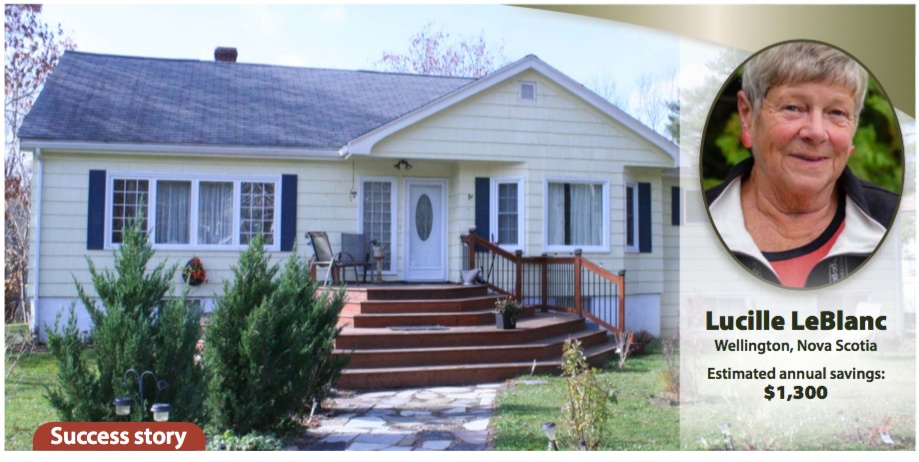
EnerGuide evaluation points Nova Scotia homeowner to big savings on energy
Reproduced with permission from Natural Resources Canada, 2016
A significant part of our efforts at Efficiency Properties is to provide quality educational content regarding energy efficiency and sustainability. Part of this initiative is to inform our audience on existing government programs and certifications. EnerGuide is a rating system managed by Natural Resources Canada. The case study presented below briefly outlines some of the steps homeowners can follow in order to upgrade their homes to become more energy-efficient. For more information on EnerGuide home evaluations or NRCan provincial programs you may contact us at [email protected] or visit NRCan’s EnerGuide website.

“.. without the information I got from the energy advisor, I would hardly have known where to start.”
When Pauline and Wayne Pelkey bought the house a couple doors down from their home in Woodstock, New Brunswick, they were not quite sure what they were going to do with it. “We were thinking we might rent it out or that we might even move into it ourselves,” says Pauline, “Either way, we knew the house needed a lot of work to bring it up-to-date.”
While the Pelkeys were drawing up their renovation plans, a friend mentioned they should look into having an EnerGuide home evaluation. “Since we were going to basically gut the house and start over anyway, it seemed like a good idea to see how we could make it more energy-effcient at the same time,” says Pauline. “And if we qualified for some of the incentive programs that were available at the time, so much the better.”
When the energy advisor submitted the results of the energy evaluation of the house, the Pelkeys were convinced that energy efficiency had to be one of their renovation priorities. “The evaluation gave the house an EnerGuide rating of 37,” says Pauline. “That’s really not very good, even for a 60-year old house.”
The evaluation identified issues, from poor insulation to air leaks, that were making an already inefficient heating system even less efficient. “If you added up all the air leaks the advisor found, it was like having a hole nearly a metre square in the wall,” says Pauline.
The Pelkeys went to work on the house, stripping it down to its bones, inside and out. “We did just about everything you can imagine,” says Pauline.

“You learn as you go along,” says Lou. “The first time I used a can of spray foam insulation, it was a little messy, but you get a knack for it pretty quickly.”
I am text block. Click edit button to change this text. Lorem ipsum dolor sit amet, consectetur adipiscing elit. Ut elit tellus, luctus nec ullamcorper mattis, pulvinar dapibus leo.
“We were going to do most of those things anyway,” says Pauline. “But thanks to the information we got through the evaluation,
we were able to make the best choices and do some additional things to make the house more energy- efficient – things we might never have thought of if we hadn’t had the evaluation. And our advisor was really helpful any time we had questions.”
Natural Resources Canada’s Office of Energy Effciency
Leading Canadians to Energy Efficiency at Home, at Work and on the Road
For information regarding reproduction rights, contact Natural Resources Canada at [email protected]
© Her Majesty the Queen in Right of Canada, as represented by the Minister of Natural Resources, 2015
Aussi disponible en français sous le titre : Grâce aux conseils obtenus après une évaluation ÉnerGuide, une maison de 60 ans devient plus écoénergétique qu’une neuve
Cat. No. M144-266/2015E-PDF (Online) ISBN 978-0-660-03840-7


